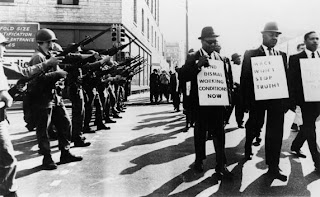 |
| Memphis, 1968: National Guard and striking workers. |
Peaceful strikers were gassed, beaten, dragged and arrested by Memphis police. Eventually the workers, carrying nothing more picket signs, were confronted by National Guardsmen in tanks, wielding rifles and bayonets.
America's long history of attacking labor unions is repeating itself today with attacks on government workers. Robert Reich in a recent Huffington Post mentions the Memphis sanitation strike as he reviews criticisms of government workers. He writes,
It's ... convenient to go after people who are doing the public's work -- sanitation workers, police officers, fire fighters, teachers, social workers, federal employees -- to call them "faceless bureaucrats" and portray them as hooligans who are making off with your money and crippling federal and state budgets.Reich points out that dishonest attacks on government workers support the lie that our economic problems result from government that's too big. He sets the record straight:
...over the last fifteen years the pay of public sector workers has dropped relative to private-sector employees with the same level of education. Public sector workers now earn 11 percent less than comparable workers in the private sector, and local workers 12 percent less.He also notes that public pensions -- like private-sector pensions -- are underfunded because of investment losses in the Great Recession, not because too many retirees are taking too much money.
After a career with annual pay averaging less than $45,000, the typical newly-retired public employee receives a pension of $19,000 a year. Few would call that overly generous. And most of that $19,000 isn't even on taxpayers' shoulders. While they're working, most public employees contribute a portion of their salaries into their pension plans. Taxpayers are directly responsible for only about 14 percent of public retirement benefits. Remember also that many public workers aren't covered by Social Security, so the government isn't contributing 6.25 of their pay into the Social Security fund as private employers would.Reich's essay was published almost simultaneously with The Guardian's terrific explanation of how unions are taking the heat for the finance industry's blunders. Paul Harris writes,
What is perverse about this trend is just how vastly it misunderstands what went wrong with the American economy...the fundamental truth remains: powerful and reckless unions did not cause the Great Recession by rampant speculation. Nor did an out-of-control labour movement cause or burst the housing bubble. It was not union bosses who packaged up complex derivatives to sell in their millions and thus wrecked the economy and put millions out of work. Nor was it union bosses who awarded (and continue to award) themselves salaries worth hundreds of millions of dollars for doing nothing of social value. Neither was it the union movement that was bailed out by the taxpayer and then refused to change its habits.
All that was the work of the finance industry.Harris praises unions for their flexibility in sacrificing wages to preserve jobs. But the inflexible banking industry,
...where true and meaningful reform has failed to happen, still squeals as if President Obama were a raving socialist. ..In fact, American bankers and big corporations are flush with cash and generous tax breaks and back to most of their old habits (like grotesque bonus payouts, refusing to loan money and offshoring jobs and profits)...Never, he wrote, "has demonising the labour movement and the hardworking Americans it represents seemed more out of place."
Amen, brother.
